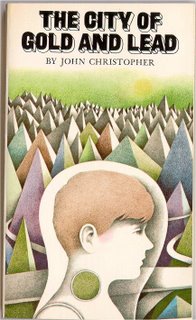Connections Week (#2): The Alchemyst's Journal (or Dweller on the Threshold)


1.
Yesterday morning I finished John Christopher's The City of Gold and Lead (1967), part two of his post-alien-invasion Tripods sequence. (It was due at the library.) Our free-thinking narrator competes in Olympic-style games versus "capped" (i.e., brainwashed) youths; as one of the victors, he's deemed worthy to be a servant for the mysterious overlords who rule earth. Thus he infiltrates the "City of Tripods," only to discover that the Tripods are themselves controlled by triangular shaped, tri-tentacled "Masters." (The emphasis on three, pyramids, etc. is quite thorough.)
2.
Curiously, the name or phrase "The City of Gold and Lead" is never used in the book, aside from the title. Indeed, if the metals are mentioned, I missed it. Perhaps Christopher's meaning is metaphorical: The city could be said to serve as a crucible in which our hero's resolve is purified.
3.
Gold and lead, of course, are the alchemical antinomies—alchemists labored to produce the former from the latter (as well as seeking the elixir of life, etc.).
4.
Uncanny: This morning, the lead piece in the Science Times is about...alchemy.
5.
Anyway, the line that came into my head while finishing up the Christopher book was from the Arcade Fire: "You change all the lead/sleeping in my head to gold" (from the song "Neighborhoods #1: Tunnels").
I wrote this down in my little notebook (though slightly incorrectly—turn instead of change, lying instead of sleeping).
6.
During "The Gates" in Central Park last year, I began shooting bits of footage using my digital camera (a still camera that can take a little bit of video).

7.
"Randomly," I scored the first bit of footage to Beck's "The Golden Age"; I scored the second bit of footage to the Arcade Fire song "Neighborhoods #1: Tunnels."
8.
I eventually grouped all these pieces of footage into a folder called "The Arcades Project."
9.
From the Dizzies archives: On February 11, I wondered this. On February 15, I made these connections.
9.5
Here, by the way, is an image of Dani Karavan's (rectilinear, orange-rusty) Hommage à Walter Benjamin, at Port Bou, where his remains are(n't?):

10.
Anyway—back to 9. The act of crossing beneath each gate, the extravagant brightness when the sun hit the fabric—imagine the arcades of 19th century Paris, ablaze as you pass through.

10.5
Alchemy at work: Transforming lead (the concrete paths—overfamiliar, and in the winter as dreary as lead) into gold (something bright, new, and costly!).
11.
Later I was intrigued to discover, upon (re)reading Chris Reynolds's mysterious comic book, The Dial and Other Stories (Kingly Books, 2004), that there was a sequence entitled "The Golden Age." Shades of the Beck song—though CR's comics appeared long before the Sea Change album.
12.
Right before CR's "The Golden Age" starts, there's a one-page story entitled "In and Out of the Sun." The text reads, in its entirety:
Panel 1: In and out of the sun.
Panel 2: The sunlight roars across the fields towards me.
Panel 3: All those old hills.
Panel 4: Where were you when we both were children?
13.
The sunlight, the "old hills"—to someone who's just emerged from "The Gates," these words and images resonated. And the final, seeming non sequitur is congruent with the childhood-nostalgic lyrics of the Arcade Fire song. (Not to mention: the lost childhood in the Tripods books.) (Something about "The Gates" was both exhilarating and very regressive; another of my mini-movies was entitled "Birth," overtly inspired by the film Birth, which begins with a death under one of the bridges in Central Park.)
But what's even more stunning is the image in that last panel—laundry flapping on the line, an uncanny visual echo of Christo's "Gates."

Coda:
But sometimes we remember bedrooms...and our parents' bedrooms...and the bedrooms of our friends...—The Arcade Fire, "Neighborhoods #1: Tunnels"
Ah, I remember this! Our parents, me, and sis in the garden that day we finished the tree-house . . . —Chris Reynolds, "The Dial"

0 Comments:
Post a Comment
<< Home